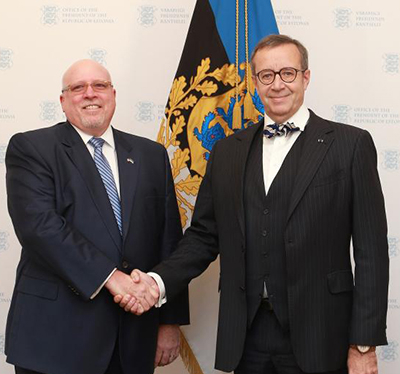America’s New Ambassador to Estonia is a Rutgers Law School Graduate
James Melville’s foreign-service career has taken him from Europe to Africa and Russia

'I’ve found the law useful in understanding how our government system works, whether I’m explaining it to foreigners or trying to figure out what’s really going on in Washington.'– James D. Melville
James D. Melville’s career has taken him all over the world – from Berlin, where he was the press officer when President Reagan told Mikhail Gorbachev to “tear down this wall,” to his current post as the U.S. ambassador to Estonia. He also worked in the Republic of Seychelles, off of the Eastern coast of Africa as a consulate officer for two years, providing services for over 3,000 American citizens who lived there.
Melville, a 1982 graduate of Rutgers Law School in Newark, moved to the Baltic country in December after being nominated for the post by President Obama last fall. He lives in Estonia with his wife, Joanna, and works at the U.S. Embassy in the capital city of Tallinn.
Overseas government service is hardly a typical path for a lawyer, but it is a more common than one would think. “Ten out of 50 of my foreign-service classmates in 1985 were lawyers,” Melville said. “I’ve found the law useful in understanding how our government system works, whether I’m explaining it to foreigners or trying to figure out what’s really going on in Washington.”
As ambassador, his number one priority is to ensure the U.S. and NATO ally Estonia deters further Russian aggression. Security and defense, he said, are the biggest issues facing the country of 1.3 million people bordered by Russia, Latvia, the Gulf of Finland and the Baltic Sea.
“Estonians have their own history of being occupied by the former Soviet Union after World War II,” Melville said. “They are hyperaware of the fact that they are vulnerable.”
Other diplomatic challenges, he said, include “climate change, countering ISIL, pressing Russia to implement the Minsk agreements and withdraw from Ukraine and many other issues are an important part of the embassy’s work.”
During the last few months, Melville has been traveling around his adopted country getting to know its people, many of whom are leaders in technology. He pointed out, for example, that Estonian software engineers developed Skype and music-sharing software, though much of the country still relies on its natural forests for industry.
“They are at the cutting edge of the digital world,” said Melville, who recently was named honorary chair of the American Chamber of Commerce in his host country.
Throughout his career, Melville has witnessed history unfold around the world.
His first assignment with the State Department was in the late 1980s in East Germany as the press officer during the Reagan administration. He was on an airplane returning from Japan when he saw an ABC News broadcast that the Berlin Wall had fallen. The news brought him to tears, “My wife and I just started crying. We were Berliners. We couldn’t believe it. The airline brought us a bottle of champagne We were changing the world for the better – as Americans, we take it for granted.”
Melville, who speaks Russian, German and French and is learning Estonian, has seen his share of diplomatic challenges. When he was stationed during the 1990s in St. Petersburg, he had hoped that Russia would liberalize its economy and business interests, but Russian leadership didn’t allow for much democratization of the west. When he was in Moscow, Melville said he tried to work with government officials on a number of issues involving trade, energy resources, the economy and combatting terrorism. He said diplomatic efforts were often thwarted by government micromanaging.
During the last decade, the terrorism threat has had huge impact on his career. Working at the U.S. Embassy in London from 2008 to 2010, Melville was in charge of selling the embassy at Grosvenor Square and arranging for a more secure high-rise to be constructed in the Nine Elms District in London, because of concerns that the building was a potential target for terrorists. ““We’ve been building new embassies that are set back [from the street.]” While stationed in Europe, he worked with his host countries to identify threats from foreign fighters and to counter those threats, particularly jihadi who were returning to Europe from places in the Middle East, including Syria.
Though it’s been many years since he’s lived in the United States, Melville still has his Jersey roots. His two grown sons live in South Jersey and his siblings as well as his wife’s family still live in the Garden State. Melville says he visits the same dentist he’s had for 20 years in Union and he and his wife try to get back to the New Jersey once a year.
“I just listened to an interview I did with a Russian language radio station in Tallinn and they ended the piece with the Boss playing ‘Glory Days,’” he said.
Melville said he keeps in touch with some of his law school alumni friends through Facebook and has fond memories of taking constitutional law classes with former Rutgers Law professor and civil rights leader, Arthur Kinoy.
“If any of my classmates are going to be in Tallinn in the next couple of years, I’d love to catch up, so let me know,” he said. “My wife and I plan to move home when we retire from the Foreign Service and maybe I’ll hang up a shingle and see if I can really get back to my roots.”
For media inquiries, contact Elizabeth Moore at eam323@kinoy.rutgers.edu or 973-353-5553.